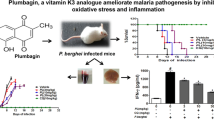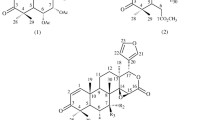Abstract
Rutin (3, 3′, 4′ 5 and 7-pentahydroxyflavone-3-rhamnoglucoside) is a flavonoid glycoside, found in many edible plants such as buckwheat and berries. Severe malaria is an inflammatory response triggered by oxidative stress that results in multi-organ pathologies and a high mortality rate in children and pregnant women worldwide. Rutin is recommended as a food supplement for the treatment of various diseases due to its anti-oxidative and anti-inflammatory properties, which prompted us to investigate its ameliorative effects in severe malaria pathogenesis against oxidative stress and inflammatory response using in vitro and in vivo bioassays. Rutin was examined in this work for its anti-plasmodial activity against chloroquine-sensitive and resistant Plasmodium falciparum strains, as well as its anti-oxidative and anti-inflammatory activity against LPS-stimulated macrophage cells. The in vitro data were subsequently verified in mice fed orally with rutin alone or in combination with chloroquine in Plasmodium berghei-induced malaria pathogenesis. The anti-plasmodial and anti-inflammatory properties of rutin were demonstrated in in vitro results. Apart from its anti-inflammatory and anti-oxidant effects in malaria pathogenesis, in vivo efficacy studies indicated that oral treatment with rutin reduced parasitaemia, increased mean survival time, and restored haemoglobin and glucose levels in mice at lower dose. Interestingly, both rutin and chloroquine demonstrated synergy in in vitro and in vivo experiments. The findings of the present study thus highlighted the suitability of rutin for further study in the management of drug resistant malaria in combination with standard anti-malarial drugs.
Graphical abstract









Similar content being viewed by others
Abbreviations
- P. falciparum :
-
Plasmodium falciparum
- MAPK:
-
Mitogen-activated protein kinase
- NOS:
-
Nitric oxide synthase
- NF-κB:
-
Nuclear factor-kappa B
- iNOS:
-
Inducible nitric oxide synthase
- RPMI-1640:
-
Roswell park memorial institute 1640
- CQ:
-
Chloroquine
- DMSO:
-
Dimethylsulfoxide
- DMEM:
-
Dulbecco’s modified eagle medium
- FBS:
-
Fetal bovine serum
- PBS:
-
Phosphate-buffered saline
- LPS:
-
Lipopolysaccharide
- BSA:
-
Bovine serum albumin
- MTT:
-
(3-(4,5-Dimethylthiazol-2-yl)-2,5-diphenyltetrazolium)
- ELISA:
-
Enzyme-linked immunosorbent assay
- ROS:
-
Reactive oxygen species
- CMH2DCFDA:
-
Chloromethyl-2′,7′-dichlorodihydrofluorescein diacetate
- TNF-α:
-
Tumour necrosis factor-alpha
- IL-6:
-
Interleukin-6
- IL-1β:
-
Interleukin-1-beta
- P. berghei :
-
Plasmodium berghei
- RBC:
-
Red blood cell
- ACD:
-
Acid citrate dextrose saline
- CMC:
-
Carboxymethylcellulose
- IFN-γ:
-
Interferon-gamma
- TMB:
-
Tetramethylbenzidine
- MDA:
-
Malondialdehyde
- TBA:
-
Thiobarbituric acid
- TCA:
-
Trichloroacetic acid
- SDS:
-
Sodium dodecyl sulphate
- FIC:
-
Fractional inhibitory concentrations
- ƩFIC:
-
Summation fractional inhibitory concentrations
References
Adderley JD, von Freyend SJ, Jackson SA et al (2020) Analysis of erythrocyte signalling pathways during Plasmodium falciparum infection identifies targets for host-directed antimalarial intervention. Nat Commun 11:1–13. https://doi.org/10.1038/s41467-020-17829-7
Bawankule DU, Chattopadhyay SK, Pal A et al (2008) Modulation of inflammatory mediators by coumarinolignoids from Cleome viscosa in female swiss albino mice. Inflammopharmacology 16:272–277. https://doi.org/10.1007/S10787-008-8012-0
Chakraborthy A, Ramani P, Sherlin HJ, Premkumar P, Natesan A (2014) Anti-oxidant and pro-oxidant activity of vitamin C in oral environment. Indian J Dent Res 25:499–504. https://doi.org/10.4103/0970-9290.142547
Chauhan K, Kaur G, Kaur S (2018) Activity of rutin, a potent flavonoid against SSG-sensitive and -resistant Leishmania donovani parasites in experimental leishmaniasis. Int Immunopharmacol 64:372–385. https://doi.org/10.1016/J.INTIMP.2018.09.026
Chobot V, Kubicova L, Bachmann G, Hadacek F (2013) Versatile redox chemistry complicates anti-oxidant capacity assessment: flavonoids as milieu-dependent anti- and pro-oxidants. Int J Mol Sci 14:11830–11841. https://doi.org/10.3390/ijms140611830
Choy KW, Murugan D, Leong XF et al (2019) Flavonoids as natural anti-inflammatory agents targeting nuclear factor-kappa B (NFκB) signaling in cardiovascular diseases: a mini review. Front Pharmacol 10:1–8. https://doi.org/10.3389/fphar.2019.01295
De Souza MC, Padua TA, das Graças HM (2016) Multiple organ dysfunction during severe malaria: the role of the inflammatory response. In: Current topics in malaria, p 85. IntechOpen
Drewry LL, Harty JT (2020) Balancing in a black box: potential immunomodulatory roles for TGF-β signaling during blood-stage malaria. Virulence 11:159–169. https://doi.org/10.1080/21505594.2020.1726569
Fabbri C, De Cássia MNR, Lalwani P et al (2013) Lipid peroxidation and anti-oxidant enzymes activity in Plasmodium vivax malaria patients evolving with cholestatic jaundice. Malar J 12:1–7. https://doi.org/10.1186/1475-2875-12-315
Fivelman QL, Adagu IS, Warhurstn DC (2004) Modified fixed-ratio isobologram method for studying in vitro interactions between atovaquone and proguanil or dihydroartemisinin against drug-resistant strains of Plasmodium falciparum. Antimicrob Agents Chemother 48:4097–4102. https://doi.org/10.1128/AAC.48.11.4097-4102.2004
Franklin BS, Ishizaka ST, Lamphier M, Gusovsky F et al (2011) Therapeutical targeting of nucleic acid-sensing Toll-like receptors prevents experimental cerebral malaria. Proc Natl Acad Sci 108:3689–3694. https://doi.org/10.1073/pnas.1015406108
Ganeshpurkar A, Saluja AK (2017) The pharmacological potential of rutin. Saudi Pharm J 25:149. https://doi.org/10.1016/J.JSPS.2016.04.025
Gelband H, Panosian CB, Arrow KJ (eds) (2004S) Saving lives, buying time: economics of malaria drugs in an age of resistance. The National Academies Press, Washington, DC. https://doi.org/10.17226/11017
Gupta AC, Mohanty S, Saxena A et al (2018) Plumbagin, a vitamin K3 analogue ameliorate malaria pathogenesis by inhibiting oxidative stress and inflammation. Inflammopharmacology 26:983–991. https://doi.org/10.1007/s10787-018-0465-1
Kauffmann N, da Penha LKRL, Braga DV et al (2021) Differential effect of anti-oxidants glutathione and vitamin C on the hepatic injuries induced by Plasmodium berghei ANKA infection. Biomed Res Int 2021:1–8. https://doi.org/10.1155/2021/9694508
Kessler M, Ubeaud G, Jung L (2003) Anti- and pro-oxidant activity of rutin and quercetin derivatives. J Pharm Pharmacol 55:131–142. https://doi.org/10.1211/002235702559
Kumar S, Pandey AK (2013) Chemistry and biological activities of flavonoids: an overview. Sci World J 4:1–16. https://doi.org/10.1155/2013/162750
Kumar S, Mina P, Kumar R, Pal A, Ahmad A, Tandon S, Darokar MP (2021) 4-Chlorothymol exerts anti-plasmodial activity impeding redox defence system in Plasmodium falciparum. Front Pharmacol 12:93. https://doi.org/10.3389/fphar.2021.628970
Leao L, Puty B, Dolabela MF, Povoa MM, Ne YG, Eiro LG, Fagundes NC, Maia LC, Lima RR (2020) Association of cerebral malaria and TNF-α levels: a systematic review. BMC Infect Dis 20:1–7. https://doi.org/10.1186/s12879-020-05107-2
Menard D, Dondorp A (2017) Antimalarial drug resistance: a threat to malaria elimination. Cold Spring Harb Perspect Med 7:1–24. https://doi.org/10.1101/CSHPERSPECT.A025619
Mohanty S, Srivastava P, Maurya AK et al (2013) Antimalarial and safety evaluation of Pluchea lanceolata (DC.) Oliv. & Hiern: In vitro and in vivo study. J Ethnopharmacol 149:797–802. https://doi.org/10.1016/j.jep.2013.08.003
Mohanty S, Maurya AK, Jyotshna et al (2015) Flavonoids rich fraction of Citrus limetta fruit peels reduces proinflammatory cytokine production and attenuates malaria pathogenesis. Curr Pharm Biotechnol 16:544–552. https://doi.org/10.2174/138920101606150407114023
Nafees S, Rashid S, Ali N et al (2015) Rutin ameliorates cyclophosphamide induced oxidative stress and inflammation in Wistar rats: role of NFκB/MAPK pathway. Chem Biol Interact 231:98–107. https://doi.org/10.1016/J.CBI.2015.02.021
Oakes KD, Van Der Kraak GJ (2003) Utility of the TBARS assay in detecting oxidative stress in white sucker (Catostomus commersoni) populations exposed to pulp mill effluent. Aquat Toxicol 63:447–463. https://doi.org/10.1016/s0166-445x(02)00204-7
Ohkawa H, Ohishi N, Yagi K (1979) Assay for lipid peroxides in animal tissues by thiobarbituric acid reaction. Anal Biochem 95:351–358. https://doi.org/10.1016/0003-2697(79)90738-3
Oludele OJ, Adisa BA, Olufunso OO (2020) Regulated rutin co-administration reverses mitochondrial-mediated apoptosis in Plasmodium berghei-infected mice. Biochem Biophys Res Commun 522:328–334. https://doi.org/10.1016/J.BBRC.2019.11.067
Park TY, Jang Y, Kim W et al (2019) Chloroquine modulates inflammatory autoimmune responses through Nurr1 in autoimmune diseases. Sci Rep 9:1–11. https://doi.org/10.1038/s41598-019-52085-w
Rout S, Mahapatra RK (2019) Plasmodium falciparum: multidrug resistance. Chem Biol Drug Des 93:737–759. https://doi.org/10.1111/CBDD.13484
Rudrapal M, Chetia D (2016) Plant flavonoids as potential source of future antimalarial leads. Syst Rev Pharm 8:13–18. https://doi.org/10.5530/srp.2017.1.4
Saxena A, Yadav D, Mohanty S et al (2016) Diarylheptanoids rich fraction of Alnus nepalensis attenuates malaria pathogenesis: In vitro and In vivo study. Phyther Res 30:940–948. https://doi.org/10.1002/ptr.5596
Schofield L, Grau GE (2005) Immunological processes in malaria pathogenesis. Nat Rev Immunol 5:722–735. https://doi.org/10.1038/nri1686
Sharubutu F, Usman AD (2019) Assessment of hypoglycaemia and aneamia associated with malaria parasitaemia among pregnant women attending some selected hospitals in Kano metropolis. Bayero J Pure Appl Sci 11:477. https://doi.org/10.4314/bajopas.v11i1.76s
Trager W, Jensen JB (1976) Human malaria parasites in continuous culture. Science 20:673–675. https://doi.org/10.1126/science.781840
WHO (2020) World malaria report 2020: 20 years of global progress and challenges. World Health Organization, Geneva
Wright CW (2005) Plant derived antimalarial agents: new leads and challenges. Phytochem Rev 4:55–61. https://doi.org/10.1007/s11101-005-3261-7
Acknowledgements
We are thankful to Director, CSIR-Central Institute of Medicinal and Aromatic Plants, Lucknow, India for rendering essential research facilities and support. The study was financially supported by CSIR under projects HCP-0007 and HCP-00352. The first author also acknowledges the fellowship provided by the Department of Science and Technology (DST), New Delhi, India.
Author information
Authors and Affiliations
Corresponding authors
Ethics declarations
Conflict of interest
Authors declare no conflicts of interest.
Additional information
Publisher's Note
Springer Nature remains neutral with regard to jurisdictional claims in published maps and institutional affiliations.
Rights and permissions
About this article
Cite this article
Bhatt, D., Kumar, S., Kumar, P. et al. Rutin ameliorates malaria pathogenesis by modulating inflammatory mechanism: an in vitro and in vivo study. Inflammopharmacol 30, 159–171 (2022). https://doi.org/10.1007/s10787-021-00920-w
Received:
Accepted:
Published:
Issue Date:
DOI: https://doi.org/10.1007/s10787-021-00920-w




